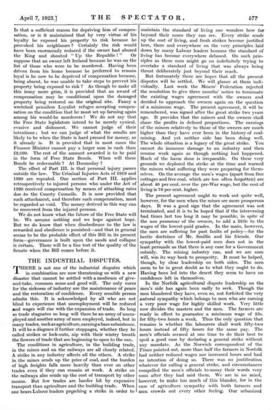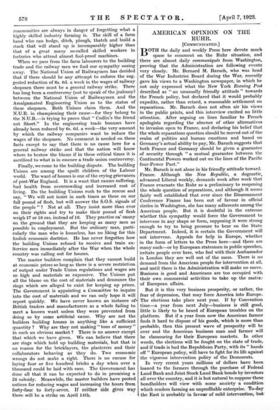THE INDUSTRIAL DISPUTES.
THERE is not one of the industrial disputes which The conditions in agriculture, in the building trade, in the mines and on the railways are all closely related. A strike in any industry affects all the others. A strike in the mines sends up the price of coal, and the burden of high freights falls more heavily than ever on other trades even if they can remain at work. A strike on the railways also sends up the cost of transport by other means. But few trades are harder hit by expensive transport than agriculture and the building trade. When one hears Labour leaders prsaching a strike in order to maintain the standard of living one wonders how far beyond' their noses they can see. Every strike sends up the cost of living, and fresh strikes become justified here, there and everywhere on the very principles. laid down by many Labour leaders because the standard of living has become everywhere debased. On such prin- ciples as these men might go on indefinitely trying to overtake a standard of living that was always being thrust deliberately just beyond their reach.
But fortunately there are hopes that all the present disputes will be settled. We will glance at them indi- vidually. Last week the Miners' Federation rejected the resolution to give three months' notice to terminate the existing wages agreement with the owners and decided to approach the owners again on the question of a minimum wage. The present agreement, it will be remembered, was signed after the great strike two years ago. It provides that the miners and the owners shall share the profits in defined proportions. The earnings of the miners relatively to those of the owners are much higher than they have ever been in the history of coal- mining. And yet neither side has been doing well. The whole situation is a legacy of the great strike. You cannot do immense damage to an industry and then resume work again as though nothing had happened. Much of the harm done is irreparable. On these :very grounds we deplored the strike at the time and warned the miners what suffering they were preparing for them- selves. On the average the men's wages (apart from free cottages and free coal, which are too often forgotten) are about 40 per cent. over the pre-War wage, but the cost of living is 76 per cent. higher.
The present agreement ought to work out quite well, however, for the men when the mines see more prosperous days. It was a good sign that the agreement was not terminated, and it is to be hoped that if the intervening bad times last too long it may be possible, in spite of the non possum-us of the owners, to add a little to the wages of the lowest-paid grades. In the main, however, the 'men are suffering for past faults of policy—for the hectic doctrines of Mr. Smillie and his friends. Our sympathy with the lowest-paid men does not in the least persuade us that there is any case for a Government subsidy. The mining industry can, and we are sure will, win its way back to prosperity. It must be helped, though, by clear leadership on both sides. The men seem to be in great doubt as to what they ought to do. Having been led into the desert they seem to have no confidence left in themselves.
In the Norfolk agricultural dispute leadership on the men's side has again been sadly to seek. Though the men blundered they have, even so, not forfeited the very zatural sympathy which belongs to men who are earning a very poor wage for highly skilled work. Very little now divides the masters and the men. The farmers are ready in effect to guarantee a minimum wage of 25s. for fifty-two hours a week. Thus the only question that remains is whether the labourers shall work fifty-two hours instead of fifty hours for the same pay. The men's officials seemed at one time to do their best to spoil a good case by declaring a general strike without any mandate. As the Norwich correspondent of the Times pointed out, more than half the farmers in Norfolk had neither reduced wages nor increased hours and had no intention of doing so. There was no justification whatever for calling a general strike, and circumstances compelled the men's officials to unsay their words very soon after they had said them. We are in no mind, however, to make too much of this blunder, for in the case of agriculture sympathy with both farmers and men crowds out every other feeling. Our urbanized communities are always in danger of forgetting what a highly skilled industry farming is. The skill of a farm hand who can hedge, ditch, plough, thatch and build a stack that will stand up is incomparably higher than that of a great many so-called skilled workers in factories who attend almost fool-proof machines.
When we pass from the farm labourers to the building trade and the railway men we find our sympathy oozing away. The National Union of Railwaymen has decided that if there should be any attempt to enforce the sug- gested reduction of 6s. 6d. a week in the wages of railway shopmen there must be a general railway strike. There has long been a controversy (not to speak of the jealousy) between the National Union of Railwaymen and the Amalgamated Engineering Union as to the status of these shopmen. Both Unions claim them. And the N.U.R. in championing their cause—for they belong to the N.U.R.—is trying to prove that " Codlin's the friend not Short." In the engineering trade bonuses have already been reduced by 6s. 6d. a week—the very amount by which the railway companies want to reduce the wages of the shopmen. No comment is needed on these facts except to say that there is no cause here for a general railway strike and that the nation will know where to bestow the blame if in these critical times it is sacrificed to what is in essence a trade union controversy.
Finally, we come to the building dispute. The building Unions are among the spoilt children of the Labour world. The want of houses is one of the crying grievances of post-War England. It is a want that causes suffering, bad health from overcrowding and increased cost of living. Do the building Unions rush to the rescue and say, "We will not insist in such times as these on our full pound of flesh, but will answer the S.O.S. signals of the people " ? Not at all. They insist more than ever on their rights and try to make their pound of flesh weigh 17 or 18 ozs. instead of 16. They practise ea' canny on the ground that they are keeping as many men as possible in employment. But the ordinary man, parti- cularly the man who is houseless, has no liking for this foolish economic doctrine. He has never forgotten how the building Unions refused to receive and train ex- Service men immediately after the War when the whole country was calling out for houses.
The master builders complain that they cannot build at economic prices so long as there is a severe restriction of output under Trade Union regulations and wages are so high and materials so expensive. The Unions put all the blame on the cost of materials and denounce the rings which are alleged to exist for keeping up prices. The Government is appointing a Committee to inquire into the cost of materials and we can only hope it will report quickly. We have never known an instance of- British traders and manufacturers as a whole failing to meet a known want unless they were prevented from doing so by some artificial cause. Why are not the builders building houses in anything like a sufficient quantity ? Why are they not making "tons of money" in such an obvious market ? There is no answer except that which we have given. We can believe that there are rings which hold up building materials, but that is no reason for the bricklayers, the plasterers and their collaborators behaving as they do. Two economic wrongs do not make a right. There is no excuse for laying four or five hundred bricks a day when over a thousand could be laid with ease. The Government has done all that it can be expected to do in promising a £6 subsidy. Meanwhile, the master builders have posted notices for reducing wages and increasing the hours from forty-four to forty-seven. If neither side gives way there will be a strike on April 14th.











































 Previous page
Previous page